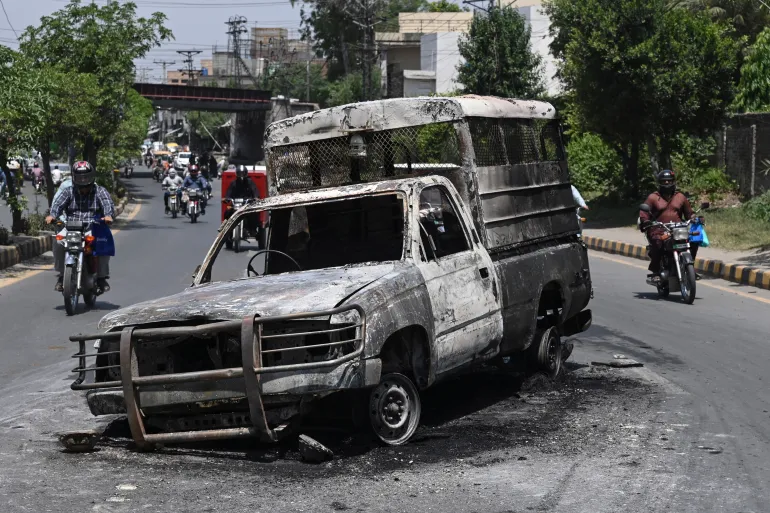NetBlocks metrics confirm the disruption of Twitter, Facebook, and YouTube on multiple internet providers in Pakistan on Tuesday 9 May 2023. Additionally, total internet shutdowns have been observed on mobile networks in some regions. The disruptions come amid the arrest of former Prime Minister Imran Khan. Nearly 125 million people have been affected by the government’s decision to suspend mobile broadband and block access to social media apps.
⚠️ Confirmed: Live metrics show that Twitter, Facebook and YouTube are now restricted across #Pakistan amid the arrest of former PM Imran Khan; the incident is likely to limit freedom of assembly and the public's ability to seek information 📉
📰 Report: https://t.co/BCs5hPpTsU pic.twitter.com/CLIjGLQFLO
— NetBlocks (@netblocks) May 9, 2023
“Internet and social media access is crucial to connect with loved ones, and to exercise the rights to free expression, access to information, and freedom of assembly. Especially amid protests and crises, people need to share and verify information and exchange diverse views. The deliberate blackouts in Pakistan undermine human rights, stifle free speech, and will only worsen the impact of the crisis by keeping people in the dark.”
There is a growing and alarming trend of authorities imposing internet shutdowns as a knee-jerk reaction to law and order situations, without regard to the impact on rights and freedoms, or any meaningful inquiry into the effectiveness of these measures. Pakistani authorities have disrupted internet access repeatedly over a year in response to political rallies and protests in the country.
Real-time network data show the disruption in effect on some but not all mobile and fixed-line internet providers in Pakistan at the time of writing. The study is taken from a sample size of 120 measurements from 60 vantage points across Pakistan.
This class of disruption can be worked around using VPN services, which are able to circumvent government internet censorship measures. However, the mobile broadband disruptions cannot be circumvented and will be experienced as a total internet shutdown by those affected.
The observed disruptions have continued into Thursday, in some cases intensifying, with hundreds of protesters reportedly detained during the information blackout. Some Instagram servers have also become unreachable since Wednesday.
The most common story is of Mohammed Faisal, a food delivery driver in Karachi, who has lost 6,000 rupees ($20) over the past three days. The 26-year-old relies on WhatsApp messaging service to receive and track the locations of his food orders.
He uses his trusty motorbike and a smartphone with mobile broadband internet to traverse the main roads, narrow streets, and densely populated neighborhoods in Pakistan’s largest and most populous city.
#Pakistan: @Volker_Turk urges restraint by security forces. Internet restrictions must be lifted. Freedom of expression, peaceful assembly & rule of law are key to resolving political conflicts – with no place for disproportionate force. Protesters should refrain from violence. pic.twitter.com/oXHPMPQvQg
— UN Human Rights (@UNHumanRights) May 11, 2023
Mohammad Fayyaz, who lives in a village in the eastern province of Punjab, feels cut off from the rest of the country during a time of major political upheaval.
“We use YouTube to watch the news, but with most social media apps being restricted since Tuesday, we feel disconnected from the events taking place in Islamabad or Lahore,”
According to Nighat Dad, a Pakistani lawyer, and digital rights activist, the shutdown of mobile broadband and social media services violates the Constitution of Pakistan.
“The ban violates Article 19 A of the Constitution and [people’s] freedom of expression, which is enshrined in the Constitution,” she said, urging the government to make a decision “with proportionality, mention its legitimate aim and be very transparent around these shutdowns”.
However, the telecommunication authority that imposed the blanket mobile broadband suspension did not indicate when the country’s 125 million mobile broadband users will be able to use the service again.
“We cannot confirm when the suspension will be lifted, as we act upon the interior ministry’s orders,” PTA’s Obaid said.
Mobile users in Pakistan are no strangers to restrictions on internet services and apps. In 2013, YouTube was banned after the video streaming service’s hosting of an anti-Islam film led to countrywide protests. The ban was lifted after three years, but the authorities have imposed unannounced shutdowns in the wake of major protests in the past few years.q
As soon as Tuesday’s shutdown was reported, Twitter users took to the platform to share novel ways to evade the ban and exchange notes on the most useful VPN services.
“The day [Tuesday] finished with VPN demand being 1,329 percent higher than the 28-day average prior to the social media blocks,” Simon Migliano of Top10VPN, a website that reviews and rates VPN services, told Al Jazeera.
Read More:











